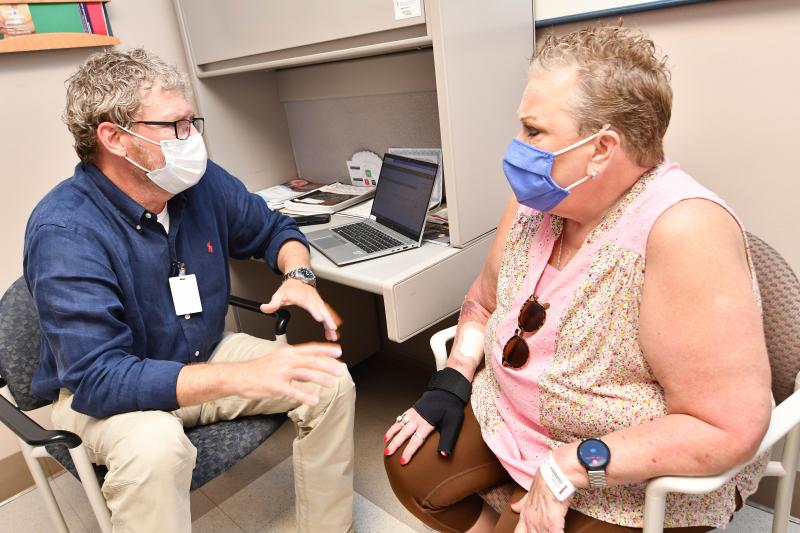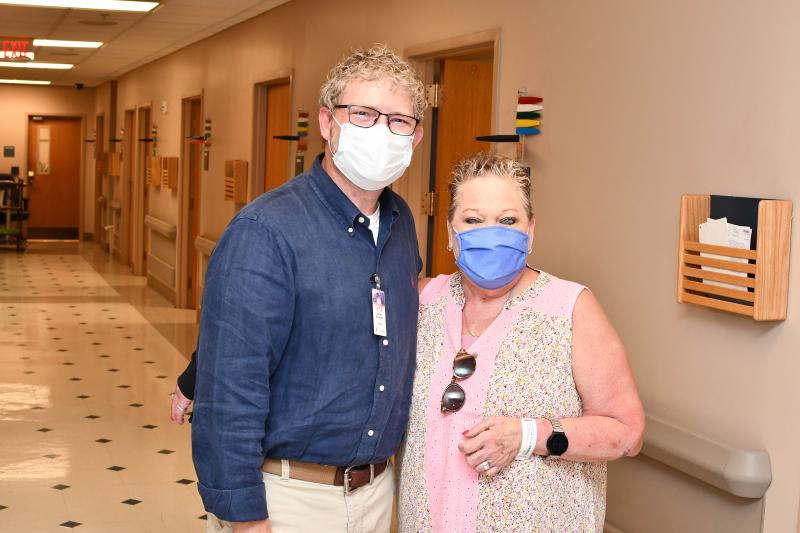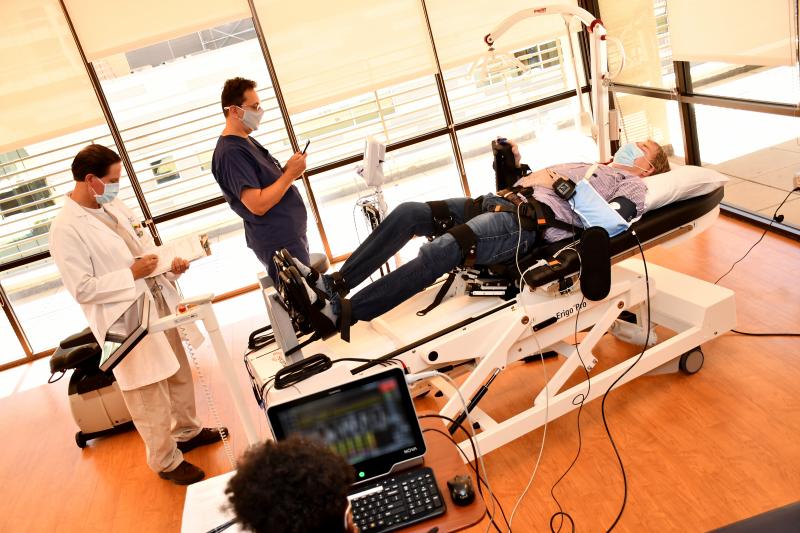It was her first visit to Methodist Rehabilitation Center’s new Recovery After COVID Clinic.
Yet Stacie Smith felt sure that clinic physician Dr. Michael Montesi would understand her symptoms. She’d already met the family practitioner when both rehabbed from COVID-19 at MRC.
“It was my first day of therapy, and I realized he had COVID just as bad as me, and he was walking without a walker or cane—that was very inspiring,” said the Jackson respiratory therapist.
“Now, I try to tell everybody who has had COVID that you need to go to the clinic. He knows what you are talking about.”
Indeed, Montesi and Smith faced many of the same hurdles after contracting the virus last year.
On July 26, the Indianola doctor went into respiratory arrest while working as a hospitalist at Bolivar Medical Center. On Aug. 2, Smith’s breathing got so bad she asked her husband to call an ambulance.
Each ended up on ventilators—Montesi for 27 days and Smith for 100. After months in the hospital, both went home hauling supplemental oxygen.
Shortness of breath is a hallmark of “Long-haul COVID,” a term for symptoms that can linger months after recovery and may impact multiple organs. And Montesi feared he might never breathe easy again.
“One of my buddies saw the initial CAT scan of my lungs and said he hadn’t seen one so bad,” Montesi said.
In addition to lung problems, many post-COVID patients complain of fatigue, brain fog, dizziness, pain, sleep disorders, fevers, anxiety, depression and erratic heart and blood pressure rates.
To deal with the diverse nature of the symptoms, MRC staffs its new clinic with a variety of medical experts. In addition to Montesi, patients might see a nurse practitioner, radiologist, wound care specialist, nutritionist, pharmacist, neuropsychologist and respiratory, speech, occupational and physical therapists.
Nurse practitioner and clinic coordinator Rhonda Meadows said the clinic is designed to be convenient and timely for patients.
“Within 72 hours of their visit, we contact patients about the team’s findings and initiate and coordinate the plan of care,” Meadows said. “We also send the plan—along with documentation—to the patient’s primary care physician.”
Providing expertise to address an emerging disease is nothing new to MRC staff.
When West Nile virus began to ravage Mississippi, MRC scientists were the first in the world to report a link between WNV and a polio-like paralysis. That led to a specialized clinic, research studies and support group meetings—the same goals MRC has in mind for COVID-19 long-haulers.
As a rehabilitation and research hospital that partners with the University of Mississippi Medical Center’s Neuro Institute, MRC staff look for ways to translate research findings into better care.
For post-COVID patients, doctors would like to solve the mystery of why some suffer precipitous drops in oxygen saturation levels with almost any physical exertion.
To that end, Montesi was evaluated in the hospital’s ErigoPro, a robotic device that combines a tilt table, functional electrical stimulation and robotic leg movements. The equipment can test how much the drop in oxygen level is related to being upright or being active.
“This is the type of stuff we have to define better,” said Dr. Art Leis, a neurologist and senior scientist for MRC’s Center for Neuroscience and Neurological Recovery. “This is going to be needed because thousands of people are now labeled as COVID-19 long-haulers.”
So far, about 30 COVID-19 survivors have done inpatient therapy at MRC. About 11 have been seen in the Recovery After COVID Clinic since it opened on May 3.
Treating post-COVID patients has given MRC staff invaluable experience, which they’re now sharing with others in the rehab field. The hospital recently hosted a presentation on the role rehab plays in the immediate and long-term recovery of post-COVID patients.
Among the takeaways was the need to keep a close vigil on patient vital signs during therapy, monitor oxygen levels and offer supplemental oxygen when needed and adjust the intensity of workouts.
“Many could only tolerate short bouts of exercise with frequent rest breaks,” said MRC physical therapist Kathleen Dobbs. “Sometimes we’d have to schedule their therapy in multiple sessions to allow for rest breaks throughout the course of the day.”
Smith can remember when she was at that point in her recovery. Today, she’s doing much better, only requiring oxygen while sleeping. But she’s continuing therapy through Methodist Outpatient Therapy in Flowood. And she’s delighted to have the added support of the Recovery After COVID Clinic.
“I loved it,” Smith said of her first clinic visit. “It’s really helpful because you meet other people who have been in your shoes. And Dr. Montesi doesn’t just shrug off your symptoms as some post-COVID thing, and say I don’t know what it is.”
While there’s still much to discover concerning the consequences of COVID-19, Montesi said he’s happy to be involved.
“It feels good to contribute,” he said. ‘I’ve always wondered why I made it and somebody else didn’t. To me, there’s a reason God put me here.”
And to hear his patients tell it, just his presence is already a source of hope.
“They have told me it’s a relief to see someone who has come through to the other side,” Montesi said. “They’ll say, ‘I’ve got foot drop and I’m still on oxygen, and you’ve gotten back to work.’ ”
For information on Methodist Rehab’s Recovery After COVID Clinic or to make a referral, call 601-364-3392.



